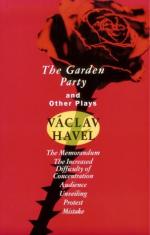|
This section contains 5,778 words (approx. 20 pages at 300 words per page) |

|
SOURCE: "Delirious Subjectivity: Four Scenes from Havel," in Essays in Theatre, Vol. 10, No. 2, May, 1992, pp. 117-32.
In the following essay, Quinn explores delirium, namely in the form of misunderstanding and confusion, in Havel's dramatic works. According to Quinn, Havel typically incorporates elements of delirium to evoke irony and satire.
Setting the Stage: the Negative Concept of Delirium
One of the most interesting products of the contemporary critical focus on semiotics in the formation of subjectivity is the "negative theory" of delirium. Unlike an ordinary analytic theory, which tries to construct coherent references, delirium involves a theory of mistaken references, of incoherence; as a supplement to theories of communication, which are designed to explain how we keep messages straight, this theory explains how sense gets lost, and the interesting things that happen when people lose it.
As a theory of confusion, delirium has several uses, especially philosophical, psychoanalytic and...
|
This section contains 5,778 words (approx. 20 pages at 300 words per page) |

|


